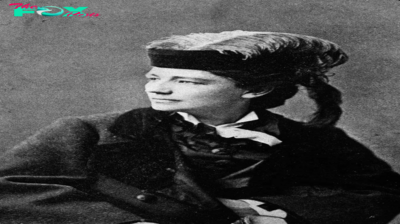US News
4B Is Not the Winning Strategy to Resist the Patriarchy People Think It Is
Shortly after Donald Trump declared victory for his second term, Google searches for the “4B movement” spiked around the country. Born from South Korea’s broader feminist reckoning over gender inequality, 4B refers to the four Korean terms for sex, dating, marriage, and childbirth. Dismayed American women, fearing a federal abortion ban and more restrictions to reproductive freedoms, ran with the idea on social media, announcing that they would no longer have sex with men, or that they were dumping their MAGA boyfriends. Popular related search terms included “head shaving” and white supremacist Nicholas J. Fuentes, who posted “You’re body, my choice” after Trump’s victory.
“Doing my part as an American woman by breaking up with my Republican boyfriend and officially joining the 4B movement this morning,” one woman shared on Tiktok the day after the election. Another American creator explained 4B’s origin like this: “The 4B movement is a movement in South Korea right now where the misogyny and sexism is so bad that South Korean women have decided to opt out of men entirely.” Some women proudly shaved their heads on camera in an effort to become less attractive to the male gaze, as though being bald might protect us from violence and subjugation—a move that I, a cancer patient, observed with bemusement and that conservatives enjoyed mocking.
Somehow, legitimate post-election fears about body autonomy and women’s safety have translated into galvanizing around a movement that is highly specific to South Korea, divorcing it from its original context and glossing over some uncomfortable realities in the process. While American women can and should share strategies to protect themselves, this whitewashed version of 4B, which has a History of anti-trans actions, is not the winning strategy to resist and undermine the patriarchy people think it is.
Hawon Jung, a journalist and author of Flowers of Fire: The Inside Story of South Korea's Feminist Movement & What It Means for Women's Rights Worldwide, says that 4B initially emerged as “part of a wider wave of feminist movement” that swept South Korea from the late 2010s to the early 2020s, in response to pervasive sexism, gender-based violence, and workplace discrimination. Much of this discussion hinged on the unfair treatment of women within the domestic sphere, specifically the disproportionate burden of childcare and household chores, rampant intimate partner violence without strong protections for victims, and the enormous pressure to get married and give birth despite it all.
“Although many women in the U.S. vow to embrace the four creeds of the 4B, I see a lot of differences compared to Korea in terms of where their voices are focused—partly because the whole social context that gave rise to the movement in the two countries are quite different,” says Jung.
“4B is at the extreme end of the whole spectrum of women in South Korea who choose to stay single and childless,” says Jung. Extreme, in part, because of hostility towards trans women, Jung explains. “Many of these young radical feminists in South Korea claim that other feminists, including mainstream women's rights groups, have lost focus by allying with other social minority groups fighting for, for example, labor rights, disability rights, or even sexual minorities' rights,” says Jung, “and vow to support ‘biological women only.’”
Unlike the U.S. post-election discourse, which I hesitate to even call “a movement” quite yet, the original 4B is concerned primarily with rejecting the institution of marriage, says Jung, with the other B’s following naturally “as an inevitable result of the rejection of marriage,” says Jung. “Why? In a conservative society in South Korea, dating is largely considered, especially by men, the prelude to marriage, and marriage the prelude for childbirth, so many of those who wish to remain single or childless end up not dating, either.”
American women, in contrast, are more-so calling for the rejection of sexual relationships with men—and becoming less sexually appealing to them as part of this. While being bald can’t protect you from, say, needing to get an abortion, getting assaulted, or bleeding out from a miscarriage, many women shared resources for staying safe in a society that’s increasingly hostile toward women, especially with the return of a president found liable for sexual abuse who has threatened to protect women “whether they like it or not.”
Read More: What Donald Trump’s Win Means for Abortion
“If we can’t control what they do in terms of legislation and abortion rights, we have to do something for ourselves,” a 25-year-old woman who posted about 4B told the New York Times. “Starting with cutting out the male iNFLuence in our life, and making sure we’re taking the safety precautions as well, visiting OB-GYNs, and making sure we are best prepared for when January comes and the years after that.”
As a gesture of self-protection, concerted celibacy is not a bad idea—even if avoiding sex will not stop men from harming us. Young women were already losing interest in sex with men, long before the election, and making conscious efforts to opt out. As someone who reports on sexual satisfaction and the “sex recession” among younger generations, I’ve found that many women are drawn to celibacy (or celibate sluthood) because they are tired of being mistreated by men and a patriarchal culture.
“The fact that the small, seemingly fringe feminist movement in South Korea is resonating with so many women in the United States seems to be a reminder [of the] frustration and anger women feel about a patriarchal society—no matter where they live and despite the cultural, political, and geopolitical differences around the world,” says Jung.
For many young Americans, of all genders, the price for sex has become steeper, dramatically so with the overturning of Roe V. Wade, while the need for sex—or marriage, or men—has lessened, a reality that experts link to rising incel ideology. There are other reasons, too, like increasingly excellent vibrators, growing visibility around asexuality, and just general burnout. Aligning with the rising social acceptance of singledom, American women have been having fewer and fewer babies since 2008, with the fertility rate reaching a record low in 2023.
But misunderstandings of the South Korean movement aside, many of the other calls to action stateside have rung somewhat hollow as they seem to suggest “getting back” at men for letting a second Trump presidency happen. The idea of punishing men for recent affronts to women’s rights —as though ladies only do sex for the benefit of male partners—erases many painful realities, including that an unmistakable majority of white women voted for Trump or that the Democrats’ centrist strategy largely failed.
Read More: The Democrats’ Blame Game Begins
Perhaps the harder-to-swallow pill is that "the problem" we’re currently facing—the terrifying, even gleeful rolling back of abortion rights, which is already killing women—is less about badly behaving men than some women might like to believe and more about a broken system (and ideologically driven judiciary mired in ethics controversies). It’s also worth noting women and men who love and voted for Trump would be unaffected by this kind of movement: According to a study from the University of Michigan, most couples share political beliefs, and Republicans are already more likely to get married than Democrats anyway, as noted by a July 2024 Gallup poll.
Of course, rejecting the hetero dating-marriage-baby pipeline is politically valid, as is asserting one’s own bodily autonomy. Sex strikes, in particular, have a storied History. In the play Lysistrata by Aristophanes, a woman attempts to end the Peloponnesian War by mobilizing women to stop having sex with their husbands and lovers. High-profile “Lysistratic non-actions,” as politically motivated sex strikes came to be known, include Togo women abstaining from sex for a week in 2012 to push for reforms, as opposition leader Isabelle Ameganvi declared sex could be a "weapon of the battle." Ameganvi invoked Liberia’s women-led peace movement, which included a sex strike among other nonviolent actions, that helped end the country’s civil war in 2003.
But South Korea’s 4B faction is too fringe and too culturally specific to yoink and whitewash. Shepherd, a U.S.-based student with family in South Korea (his full name has been protected for privacy), sees much of the posts as “wildly performative.” He notes that South Korean women often can’t find employment after having children—“my mom is in her mid-40s and is considered nearly ‘out of employment age’”—and that “women have little to no workplace protections, work culture keeps families away from their children, and the brutal schooling system also discourages people having families.” The 19-year-old adds, “4B was constructed under these circumstances. So, seeing Americans and American women jump to adopting 4B, using South Korea as an exotic site of development for a movement they want to adopt as their own, while having immense amounts of privilege, is a little frustrating.”
Shepherd, who is trans, notes that the many South Koreans participating in 4B have developed hateful anti-trans, anti-gay views, given the “bioessentialist ideology” that places immense import on child-bearing as a marker of womanhood. “Korean women aren’t transphobic or homophobic, I have friends there and they love me and my transness,” he adds. “I’m saying that the most stalwart members of the 4B movement, those who champion it the most passionately, usually fester in queerphobic forum spaces like Womad. This wasn’t intentional in the creation of the 4B movement, but a separatist movement based in biological essentialism is a movement that can very readily foster that environment.”
A few weeks after the election, American searches and social media posts about 4B have dwindled, and it’s not clear that the U.S. movement has legs outside of the general trend towards having less sex that was already in motion. Women should opt out of sex with men for literally any and all reasons on earth, for any and all lengths of time, because that is their right. The call to decenter men goes as far back as the 1960s. Taking additional safety precautions in the face of a second Trump presidency, which is sure to further criminalize women’s and trans Healthcare, is a smart idea, too.
But we are going to have to think bigger, and grow our imaginations, to build a safer world for all. 4b is not the movement to hang our hopes on.
-

 US News1d ago
US News1d agoThese Races Still Don’t Have a Clear Winner Two Weeks After Election Day
-

 US News1d ago
US News1d agoNYC Issues Drought Warning and Pauses Aqueduct Repairs
-

 US News1d ago
US News1d ago‘It’s Going to Take Everyone’: How Immigrant Advocates Are Preparing for Trump’s Return
-

 US News1d ago
US News1d agoLet’s Bring Back Romance
-

 US News5d ago
US News5d agoThe Onion Buys Alex Jones’ Infowars at Auction With Help from Sandy Hook Families
-

 US News6d ago
US News6d agoWhat to Know About Former Rep. Matt Gaetz, Trump’s Pick for Attorney General
-

 US News6d ago
US News6d agoWhat Mike Huckabee, Trump’s Pick for Israel Ambassador, Has Said About the Middle East
-

 US News6d ago
US News6d agoWatch: Donald Trump’s New Administration So Far





















